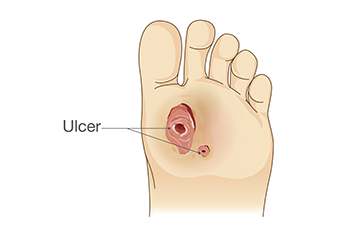 Diabetic foot ulcers are open sores or wounds that develop on the feet of individuals with diabetes. Ulcers may arise due to poor blood circulation, nerve damage known as neuropathy, and high blood sugar levels, which impair the body's ability to heal. Symptoms include redness, swelling, and drainage from the ulcer, and they may become infected if not properly treated. Some risk factors for diabetic foot ulcers are prolonged diabetes, poor glycemic control, smoking, and wearing inappropriate footwear. Additionally, foot deformities and a history of foot ulcers or amputation increase the likelihood of developing these sores. Treatment involves keeping the ulcer clean and covered, managing blood glucose levels, and taking antibiotics to prevent or treat infection. A podiatrist plays a crucial role in managing and preventing diabetic foot ulcers. They can provide routine foot care, recommend proper footwear, and offer guidance on foot hygiene. If you have diabetes and notice any foot abnormalities, it is strongly suggested that you schedule an appointment with a podiatrist to prevent complications.
Diabetic foot ulcers are open sores or wounds that develop on the feet of individuals with diabetes. Ulcers may arise due to poor blood circulation, nerve damage known as neuropathy, and high blood sugar levels, which impair the body's ability to heal. Symptoms include redness, swelling, and drainage from the ulcer, and they may become infected if not properly treated. Some risk factors for diabetic foot ulcers are prolonged diabetes, poor glycemic control, smoking, and wearing inappropriate footwear. Additionally, foot deformities and a history of foot ulcers or amputation increase the likelihood of developing these sores. Treatment involves keeping the ulcer clean and covered, managing blood glucose levels, and taking antibiotics to prevent or treat infection. A podiatrist plays a crucial role in managing and preventing diabetic foot ulcers. They can provide routine foot care, recommend proper footwear, and offer guidance on foot hygiene. If you have diabetes and notice any foot abnormalities, it is strongly suggested that you schedule an appointment with a podiatrist to prevent complications.
Wound care is an important part in dealing with diabetes. If you have diabetes and a foot wound or would like more information about wound care for diabetics, consult with Dr. Tupper from Coshocton Foot Health Center. Our doctor will assess your condition and provide you with quality foot and ankle treatment.
What Is Wound Care?
Wound care is the practice of taking proper care of a wound. This can range from the smallest to the largest of wounds. While everyone can benefit from proper wound care, it is much more important for diabetics. Diabetics often suffer from poor blood circulation which causes wounds to heal much slower than they would in a non-diabetic.
What Is the Importance of Wound Care?
While it may not seem apparent with small ulcers on the foot, for diabetics, any size ulcer can become infected. Diabetics often also suffer from neuropathy, or nerve loss. This means they might not even feel when they have an ulcer on their foot. If the wound becomes severely infected, amputation may be necessary. Therefore, it is of the upmost importance to properly care for any and all foot wounds.
How to Care for Wounds
The best way to care for foot wounds is to prevent them. For diabetics, this means daily inspections of the feet for any signs of abnormalities or ulcers. It is also recommended to see a podiatrist several times a year for a foot inspection. If you do have an ulcer, run the wound under water to clear dirt from the wound; then apply antibiotic ointment to the wound and cover with a bandage. Bandages should be changed daily and keeping pressure off the wound is smart. It is advised to see a podiatrist, who can keep an eye on it.
If you have any questions, please feel free to contact our office located in Coshocton, OH . We offer the newest diagnostic and treatment technologies for all your foot care needs.
